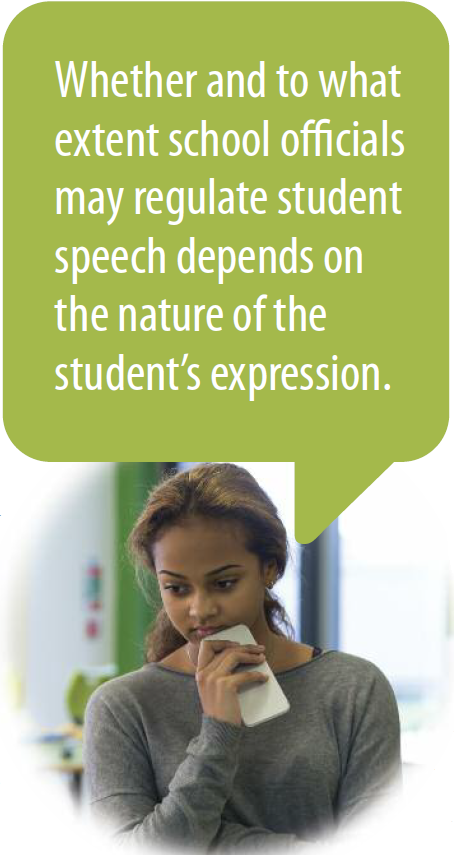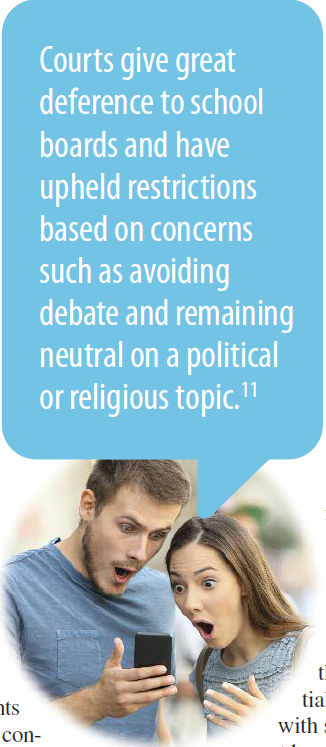You Tweeted What? Navigating First Amendment Concerns in the Public School Setting
| Publication year | 2020 |
| Pages | 0416 |

Introduction
Maybe no other area of law better captures the unique combination of political intrigue, pedagogical concerns, and practical considerations common to the education bar than speech claims under the First Amendment. This article will rely on an extended hypothetical based on some of our prior cases to describe the legal considerations for student, employee, and community member speech. Although the student speech analysis is unique to education law, the employee and community member speech issues are applicable to other public agencies and public actors.
Setting the Stage
It's election season, and the incumbent mayor is seeking reelection. Her main campaign promise is to consolidate the town's two high schools. The plan is simple: close the older, smaller school and transfer the students from that school into the newer, larger school.
Jenny Doe, a senior at the old high school, is the student editor of the school newspaper which is written and edited by students in the Journalism II class. Jenny drafted a scathing editorial which, while not vulgar, was highly critical of the mayor's proposal to close her school. She focused on the preservation of each school's identity and the friendly rivalry between schools. She ended her editorial by stating that "consolidating the schools would be like erasing half of our town's history."
Jenny shared the editorial with her teacher and newspaper sponsor, Mr. Smith. He felt that the editorial was too controversial for the school paper, and directed Jenny to publish something more positive about the school's history instead.
Jenny complied with Mr. Smith's directive not to publish her piece in the paper, but instead posted it on her social media. In her post, she explained that she felt compelled to share the editorial with her classmates via social media because Mr. Smith had not let her speak her mind in the school's newspaper. She explained that "as the editor of the newspaper," she would be doing her classmates a disservice by remaining quiet.
Jenny's editorial quickly circulated on social media, and when Mr. Smith saw it, he told her there would be consequences for her insubordination. Additionally, he posted a response on his own social media page arguing against Jenny's position, which he characterized as churlish and childish. He expressed his fears about the school system's dire financial straits and stated that consolidating the two schools is the only fiscally responsible way forward. He ended his post by stating that "we may be erasing half of the town's history, but if we don't, the whole school system will be history."
When word spread about Mr. Smith's post and his threat of disciplinary consequences, a community petition seeking Mr. Smith's immediate termination began to circulate. The "Mr. Smith MUST GO!" petition received more signatures than there are students in the school. To top it all off, many parents began seeking transfers from Mr. Smith's class for their students, explaining that they don't feel he creates a safe place for his students to express themselves.
Ms. Washington, the community member who started the petition, does not have children in the system, but she employs tutors under a contract with both high schools. The school principals can cancel the contract at any time with no penalty to the school. Mr. Hamilton, the principal of the newer school, is good friends with Mr. Smith. In an effort to help his friend, Mr. Hamilton asks Ms. Washington to take down the petition. When she refuses to do so, he sends her a letter terminating the tutoring contract. Furious at receiving the letter as it will cost her a considerable amount of revenue, Ms. Washington calls Mr. Hamilton demanding to know why he cancelled the agreement. He tells her that they can talk once the petition has been removed.
Feeling pressure from the community, Mr. Jones, the principal of the older school where Mr. Smith teaches, informs Mr. Smith that the social media post was unacceptable, and that Mr. Smith has lost the confidence of his parents. With the support of the superintendent, Mr. Smith is placed on administrative leave pending termination.
Student Speech

Students in public schools do not "shed their constitutional rights to freedom of speech or expression at the schoolhouse gate."1 Whether and to what extent school officials may regulate student speech depends on the nature of the student's expression. The U.S. Supreme Court has recognized three main categories of student speech: (1) pure student expression under Tinker v. Des Moines Independent Community School District;2 (2) vulgar, lewd, offensive, or indecent speech under Bethel School District No. 403 v. Fraser;3 and (3) school-sponsored speech under Hazelwood School District v. Kuhlmeier.4
Can Mr. Smith prohibit Jenny's editorial?
The Supreme Court has been careful to draw a distinction between the questions of whether a school board may punish a student for certain speech, as was the issue in Tinker and Fraser, or whether it may avoid publicizing certain student speech. Our first scenario falls within this second question. In that regard, the Supreme Court held in Hazelwood that a school board may exercise "editorial control over the style and content of student-speech in school-sponsored expressive activities so long as their actions are reasonably related to legitimate pedagogical concerns."5 The Eleventh Circuit has clarified that this standard controls all student-speech that (1) bears the imprimatur of the school (i.e., the school had a role in setting guidelines for and ultimately approving the speech such that a "reasonable observer" would believe it is school-sponsored)6 and (2) occurs in a "curricular activity."7 Although seemingly tied to classroom instruction, the phrase "curricular activity" is more broadly interpreted to include any expressive activity that is (a) "supervised by faculty members" and (b) "designed to impart particular knowledge or skills to student participants and audiences."8 Noticeably, there is no consideration of whether the activity is graded or earns school credit, occurs during school hours or on school campus, or is part of the school's curriculum catalog.9

In our hypothetical, there is no question the school newspaper bore the imprimatur of the school and was part of a curricular activity. The newspaper was published as part of a classroom activity, was designated as the official newspaper of the school, and was supervised by a faculty member. Thus, under Hazelwood, the school board could prohibit Jenny from publishing her article in the newspaper. The only remaining question is whether the speech limitation was "reasonably related to legitimate pedagogical concerns."10 Courts give great deference to school boards and have upheld restrictions based on concerns such as avoiding debate and remaining neutral on a political or religious topic.11 Ultimately, a court is likely to uphold the decision to prohibit publishing Jenny's article based on Hazelwood.
Can Jenny be disciplined for her social media post?
The question remains whether the school board could punish Jenny for publishing her editorial on social media as Mr. Smith threatened. In Tinker, the Supreme Court held that students cannot be punished for the mere expression of their personal views on school grounds unless the school board has reason to believe that such personal expression will cause a substantial interference with the work of the school or infringe on the rights of other students.12 While Tinker requires a substantial interference or disturbance in order to regulate student expression, a school board need not wait until a disruption actually occurs.13 Instead, the school board may regulate student expression if it can reasonably anticipate that the expression will cause substantial disruption or material interference with school activities.14 This disruption must be more than a de minimis impact or theoretical possibility of discord.15 For example, student expression may not be suppressed if it only gives rise to mild curiosity, discussion, comments, or even hostile remarks by some students.16
But what about off-campus student speech? Addressing this issue for the first time in Doe v. Valencia College, the Eleventh Circuit concluded that, "Tinker teaches that conduct by the student, in class or out of it that results in the invasion of the rights of others is, of course, not immunized by the constitutional guarantee of freedom of speech."17 Although...
To continue reading
Request your trial
